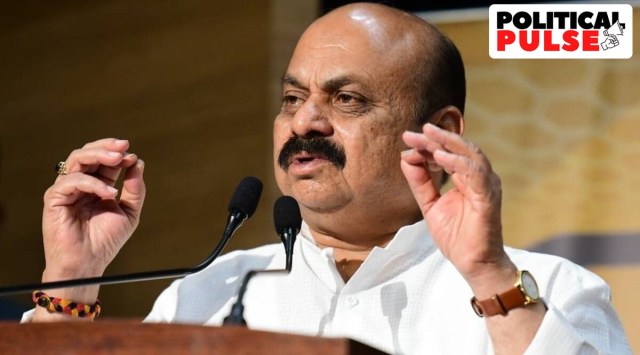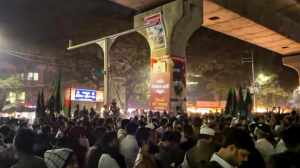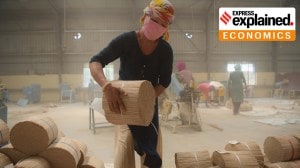Lingayats and Vokkaligas recategorised in quota matrix, BJP on guard against blowback
Some in the ruling party in Karnataka fear that the Cabinet’s decision will lead to other caste groups raising similar demands about hiking their quota share.
 Karnataka CM Basavaraj Bommai (Express photo/File)
Karnataka CM Basavaraj Bommai (Express photo/File) Facing sustained pressure from the Pannchamasali sub-sect of Veerashaiva Lingayats and to consolidate its position among the Vokkaliga community, the BJP-led Karnataka government accepted the reservation demands of the two electorally significant groups on Thursday with electoral calculations in mind in the run-up to Assembly polls. But, some in the ruling party fear that this will open the floodgates for other caste groups to raise similar demands.
The government on Thursday reclassified Vokkaligas and the Lingayat community, a key BJP support base, as “moderately backward” instead of categorising them as “backward”. This may lead to an increase in their share in the reservation pie allotted to Other Backward Classes (OBC). According to the Cabinet decision, the Vokkaliga community, which is currently in the 3A category, will be moved to a newly created 2C category with a quota of 4 per cent and the Lingayats, who were previously in the 3B category, will now be placed in the new 2D category with 5 per cent reservation. The Panchmasalis want to be included in the 2A category, which has a 15 per cent quota applicable to OBCs. After the Cabinet decision Panchamasali seer Jayamrutyunjaya Swami sought clarity on the proportion of reservation that the sub-group would receive.
Explaining why the reclassification applied to the entire Lingayat community and not just the Panchamasalis who put pressure on the government, a senior BJP leader said, “The sub-group could not be singled out while offering reservation and hence Lingayats were considered as a whole for the purpose.”
Though the Vokkaligas’ push for the quota hike from four per cent quota to 12 per cent in the now-abolished 3C category was first raised in November at a convention of the community — over a year after the Panchamasalis raised their demand — the government agreed to the demand with the elections in mind. The Vokkaligas have been the key vote base of the Janta Dal (Secular) and the Congress for decades and the ruling party saw an opportunity to gain a toehold in the community with this move.
“Also, satisfying the demands of only the Panchamasalis could have been problematic for the BJP. That is why there was a rush to appease Vokkaligas too,” said a BJP leader.
When the Panchamasalis launched their movement in early 2021, it was widely viewed in political circles as an attempt to corner then Karnataka Chief Minister BS Yediyurappa, who is a BJP Parliamentary Board member at present. Several BJP insiders speculated that the group had been propped up by leaders in the party trying to erode Yediyurappa’s claim as the undisputed Lingayat leader.
Around the same time, the Kurubas, a backward caste, launched a movement demanding inclusion in the Scheduled Tribes (ST) list. It was led by former minister KS Eshwarappa who has been pushing for his reinduction in the Cabinet. At the moment, the demand appears to be on the backburner.
There are other communities that harbour hopes of getting reservation benefits. Apart from the Kurubas, the Koli (Ganagamatastha) community wants to be included in the ST list, while the Madiwala and Beda Jangama communities want Scheduled Caste (SC) status.
A senior state Cabinet minister has expressed concern about satisfying the demands of the dominant communities, saying this will encourage other communities. Union Minister of State for Social Justice and Social Empowerment A Narayanaswamy also said recently that satisfying such demands would make reservation “meaningless” as almost all of the state’s population would be covered under some quota.
For now, the BJP appears to have calmed the storm but there is no guarantee that the Cabinet decision will pass the legal test in courts. The BJP will also miss out on any electoral benefits if the government does not finalise the amount of reservation for the Panchamasalis and Vokkaligas. The government has said that an empirical study – by the State Commission for Backward Classes – on the population of various OBC communities will be completed in three months, following which the exact hike in reservation for these communities will be announced. Another hurdle for the BJP is likely to be the fact that the Centre has to approve the decision via amendments to Schedule 9 of the Constitution as Karnataka has already breached the 50 per cent reservation cap as fixed in the 1992 Indra Sawhney case in the Supreme Court.
State Congress president DK Shivakumar on Friday said the government’s announcement was just an “eye-wash”. He said at a meeting in Bijapur, “The government has said it will announce the revised quota of these communities by redistributing the quantum of reservation available under EWS quota. Is it possible to do so in three months?”
Political observers are drawing a parallel between the BJP government’s quota decisions and the previous Congres government’s farm loan waiver announcement towards the end of its tenure in 2017. Though the decision appeared to have buoyed the Congress’s prospects at the time, it did not translate into votes and the party was voted out. It remains to be seen if a similar fate awaits the BJP.
- 01
- 02
- 03
- 04
- 05































